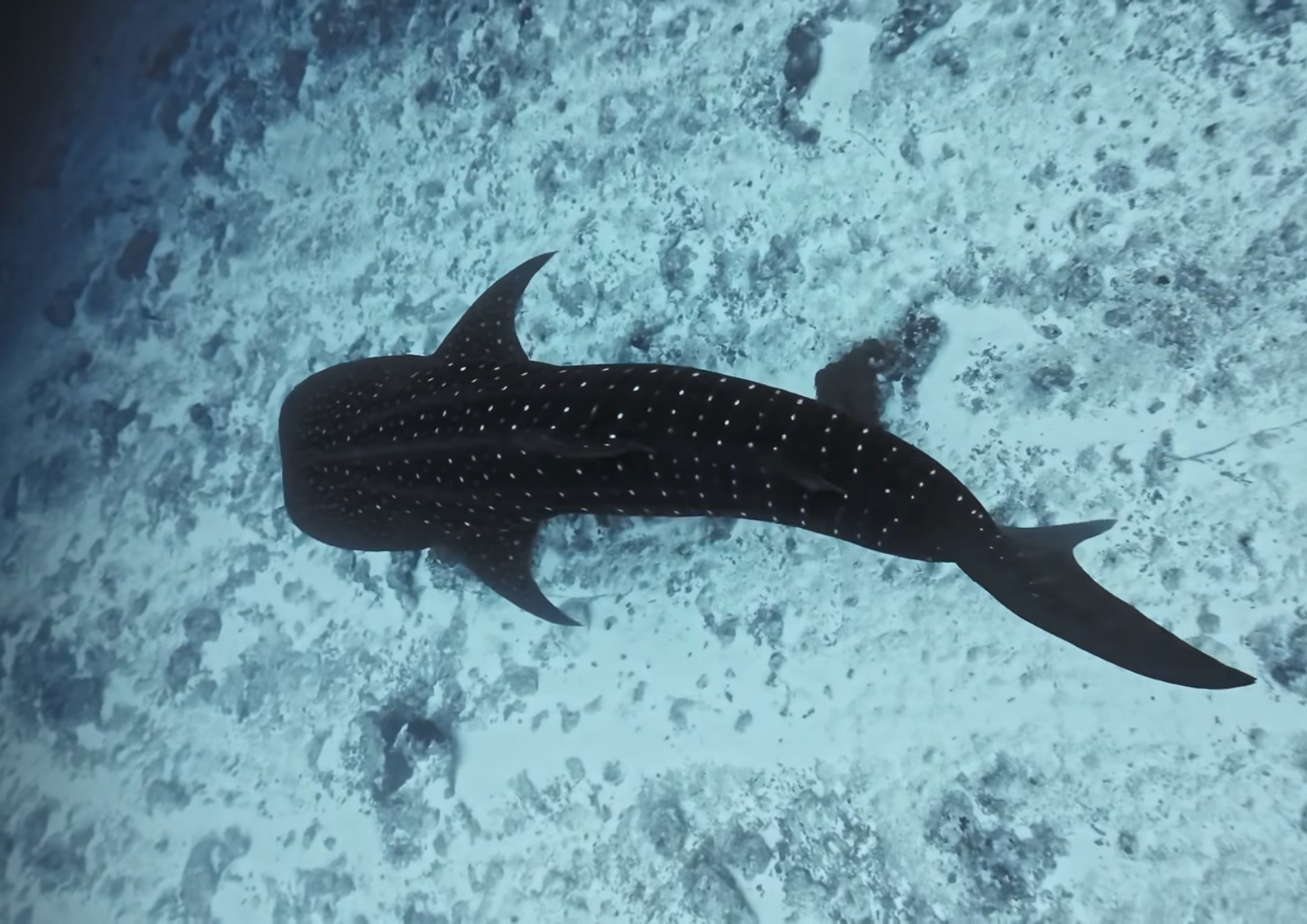SAMPA – Protecting Whale Sharks in the Maldives
Whale sharks (Rhincodon typus) are the largest known living fish. Harmless in nature, massive in physique, these slow-moving giants have been discovered to grow to the lengths of 18.8m (61.7 ft). They inhabit the open waters of all tropical oceans, very rarely being found in water below 21 °C (70 °F). Based on studies of their vertebral growth bands, it is estimated that they can live between 80 to 130 years. With very large mouths and long lives, it’s fortunate that whale sharks are filter feeders, meaning they survive almost exclusively on plankton and other small fishes. They do not pose any threat to humans. In fact, it might be the other way around, which is where the South Ari Marine Protected Area (SAMPA) comes into play.
SAMPA – How Whale Sharks in Maldives Are Protected
The government established the South Ari Marine Protected Area (SAMPA) under a protection decree that took effect on June 5, 2009, setting its boundaries 1 km seaward from reef crests. It is classified as a Category 7 under the Protected Area Regulation, meaning it is a protected area with sustainable use. The purpose of this decree is to ensure the long-term conservation of ecologically significant natural resources in the area, particularly the protection of whale sharks in Maldives and their natural habitat. According to the IUCN Redlist whale sharks are assessed to be ‘endangered’, with their population largely depleted.
SAMPA holds the title of the largest protected area in the Maldives, making it one of the world’s most significant sites for whale sharks. Whale sharks remain present in SAMPA year-round, and researchers have recorded sightings of more than 726 individual whale sharks within the Marine Protected Area (MPA) to date, with over 8,000 encounters. Many of these whale sharks return frequently to the area.
Most sightings in the areas are male juveniles (72.5%). This makes it probable that this area has the highest re-sighting rate of individual whale sharks in the world. SAMPA is likely a ‘secondary nursery’ location for whale sharks which have grown above the juvenile period. In addition, whale sharks in this region are not seen again once they grow beyond 8m, corresponding to sexual maturity. It therefore appears SAMPA offers a critical habitat in this post-juvenile-pre-mature stage.
Interacting With Whale Sharks Under SAMPA
The South Ari Marine Protected Area (SAMPA) has established specific and detailed guidelines for interactions with whale sharks in Maldives to protect these endangered species while allowing for sustainable tourism. These rules include:
Distance Requirements
- Maintain a minimum distance of 3 meters from the head or body of the whale shark
- Stay at least 4 meters away from the whale shark’s tail
- If encountering a whale shark from below, maintain a distance of at least 20 meters to allow the shark to swim upward for thermoregulation
- When a whale shark approaches within 15 meters of a vessel, all engines must be put in neutral until the shark moves more than 15 meters away
Behavioral Rules
- Strictly prohibited to touch or ride on a whale shark under any circumstance
- No deliberate crossing in front of the whale shark’s direction of travel
- No impeding the whale shark’s movement
- Approach slowly and from the sides so the whale shark can see you approaching
- No chasing after whale sharks – allow them to move freely
Environmental Considerations
- No flash photography or use of lights near whale sharks’ heads as they are sensitive to light
- No feeding of whale sharks as this disrupts their natural filter feeding behavior
- Activities should be conducted as quietly as possible – avoid aggressive flapping motions and loud movements
- No use of motorized or powered swimming/diving aids in contact zones
- When entering water from boats, do so quietly to avoid disturbing the sharks
Time and Group Management
- Snorkeling and free diving activities can only be carried from 6 AM to 6 PM
- Each group limited to 15 minutes of interaction time when other vessels are waiting
- Maximum of 60 persons total (including guides) allowed in water from contact vessels
- Guide-to-visitor ratio maintained at 1:6
- No more than 6 vessels (including ranger vessels) allowed in a 250-meter “contact zone” around a whale shark
SAMPA designed these rules to minimize stress on whale sharks in the Maldives while still providing meaningful experiences for visitors. SAMPA Rangers and Guardians enforce these rules to help the whale shark population recover and move away from endangered status.
Interested in Swimming with Whale Sharks in Maldives?
At Pelagic Divers Fuvahmulah, we emphasize quality dives with a guide to guest ratio of 1:4. This creates a safer and more personal diving experience for our guests. Interact with the ocean’s gentle giants with limited distractions. Our Maldivian dive team and instructors have certifications from SSI and complete yearly renewals through comprehensive medical evaluations. This process ensures that authorities recognize our team as professionally active and confirm them as healthy and fit diving professionals each year. Experience an unforgettable moment up close with whale sharks in the waters of the Maldives. Get in touch with our team here or see our various offered packages here.
Frequently Asked Questions
- Are there whale sharks in Fuvahmulah?
Yes, there are whale sharks in Fuvahmulah. Whale shark sightings are usually between February to April as they make their way through Fuvahmulah.
- Can I book a whale shark diving experience with Pelagic Divers Fuvahmulah?
There are possibilities to encounter whale sharks during the right season when diving in Fuvahmulah. However, it is important to note that we do not specifically have a scuba diving session just for whale sharks. Sightings of the whale sharks in Fuvahmulah can occur on any dive.
- Do you have snorkeling sessions with whale sharks?
No, we do not have snorkeling sessions with whale sharks. Encounters with whale sharks typically occur when scuba diving in Fuvahmulah.

